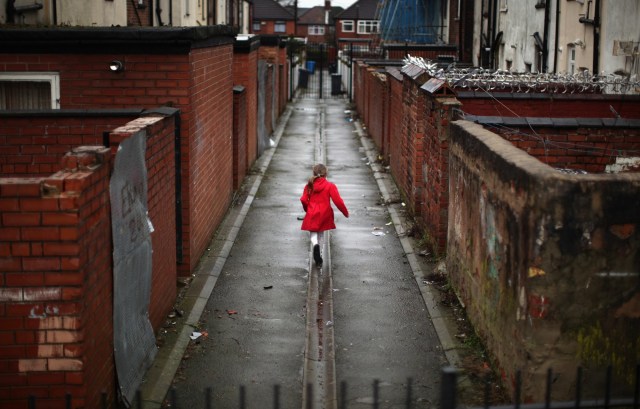Credit: Christopher Furlong/Getty

“I’ve mainly been living on soup just so my little boy can have what he needs really.” That’s not something you expect to hear from a young mother living in Britain today. Such stark choices are not supposed to exist in the fifth biggest economy and a country which believes in justice and compassion. And yet, that is the reality of life for many in the UK.
In 2017 more than one and a half million people were destitute in the UK, 365,000 of them children.[1. ‘Destitution in the UK 2018’, Joseph Rowntree Foundation, 7 June 2018; People are destitute if they have experienced at least two of the following in the last month: no meals or just one meal a day for two or more days, slept rough, been unable to heat or to light their home for five or more days, or been without basic toiletries or suitable clothes or footwear. They’re also classed as destitute if their income is so extremely low that they couldn’t afford these things (less than £10 a day for a single person).] That’s the equivalent of the populations of Birmingham and Liverpool combined.
Destitution is the most severe form of poverty. By and large it is the culmination of living on very little for a sustained period of time – it’s what forces a mother to choose between feeding herself and providing the basics for her son.
Perhaps surprisingly, the likelihood of destitution is actually greatest for men under the age of 35 – a group also greatly at risk from poor mental health, self-harm and suicide. One young man interviewed for the research told us: “Mentally it was a real strain. If it wasn’t for friends and family I don’t know if I’d still be here to be honest”.
Less surprising is the fact that destitution is most common in the cities of Northern England, the Midlands and Scotland which still bear the scars of deindustrialisation, as well as a few London boroughs. Although Oxford also features in the 10% of places with the highest rates of destitution, showing more prosperous areas are not immune.
That destitution exists on this scale should be shocking enough, but even more troubling is the fact that many people are being made destitute ‘by design’. Not because of peculiarly dire circumstances that are unpredictable or exceptional, but because of policy choices made which have left growing gaps within the social security system.
An ever-eroding safety net helps explain why single men are so vulnerable – they are most likely to be dependent on the minimum support the benefits system has to offer, and at a time when rents are rocketing and living costs rising. The inadequacies of the welfare system leaves people backed into a corner so that when their circumstances change, they have no alternative support to turn to.
There are three specific actions that the UK government could take now to protect those at risk of destitution and relieve the burden it is placing on the thousands of families already suffering.
Firstly, they should end the current freeze on working-age benefits. Most benefits for working age people have now been frozen since 2016, which means as inflation pushes up the cost of living, benefit recipients have been getting poorer.
Secondly, the use of sanctions within Universal Credit must be reformed so that people are not left destitute ‘by design’. Sanctions are an essential part of a conditional welfare system – without them there’s no backstop for when people aren’t playing by the rules. But sanctions should be proportionate, and applied fairly. The current regime means someone could receive a 3-year ban on receiving benefits, leaving them with little by way of financial support.
And thirdly, they should review the total amount of debt that can be clawed back from people receiving benefits, so people can keep their heads above water. At the moment, the system that is supposed to protect families from harm is actually making them more vulnerable. Many people in poverty are in debt to central government and their local council, and the methods used to collect funds for council tax arrears, benefit advances and utility bills are leading to destitution.
This is not about making the welfare system overly generous, or removing the expectation that where people can work, they should be actively looking to do so. It is about ensuring that individuals and families, facing often dire circumstances, can afford the basics – rent, electricity, food, shampoo, shoes. That’s surely the minimum a compassionate society should provide for those most in need.
When in 1899 a report by Seebohm Rowntree into poverty in York was read by then Liberal MP Winston Churchill, the future Prime Minister responded that the findings ‘made my hair stand on end’.
Last week’s report should be no less shocking for today’s politicians.










Join the discussion
Join like minded readers that support our journalism by becoming a paid subscriber
To join the discussion in the comments, become a paid subscriber.
Join like minded readers that support our journalism, read unlimited articles and enjoy other subscriber-only benefits.
Subscribe